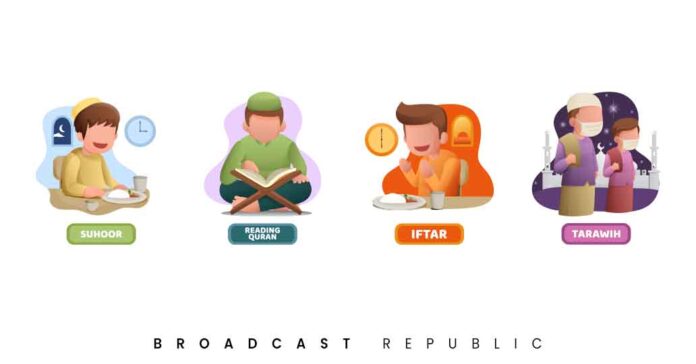The holy month of Ramadan is dedicated to Allah. The Muslim community can unite throughout this month and express humility for Allah. Moreover, Muslims throughout the world spend the Islamic holy month of Ramadan to purify their spirits and get nearer to Allah. Our bond with Allah, His prophet, and humanity is enhanced when we follow Islamic etiquette in every action we take.
In the holy month of Ramadan, Muslims observe fasting from dawn to dusk. It is a time of spiritual reflection and self-discipline. It is important to observe proper etiquettes during this month, including refraining from consuming any food or water during the fasting period. This helps to maintain the spiritual and physical purity of the individual. It is also important to be respectful of those who are fasting and not eat or drink in their presence. By practicing these etiquettes, we can show respect for the sanctity of the month of Ramadan and fully reap its benefits.
The Muhammad (PBUH) is credited with saying the following in a well-known hadith regarding fasting during the holy month of Ramadan:
من صام رمضان إيمانا واحتسابا غفر له ما تقدم من ذنبه”
“Everyone who fasts with faith during the month of Ramadan, seeking its benefit from Allah, will have his previous misdeeds forgiven,” said the Prophet (PBUH).
Fasting develops tolerance, discipline, and the ability to manage time. Furthermore, there are some precious rules and etiquette followed during fasting, which include avoiding drinking, eating, smoking, or listening to music loudly in public.
Fasting is the best way to rejuvenate yourself and your soul. In addition, in the holy month of Ramzan, fasting provides numerous benefits in your daily life regarding your health and mind. Rule and Good Manners of Fasting
Be active during Ramadan
This fasting etiquette highlights the value of staying active during the holy month of Ramadan. You should not spend the entire day sleeping and lazing at work.
Kindness and Gratitude
Ramadan is a season of giving to others and being helpful. Muslims should make an effort to be kind and assist those who are struggling.
Preventing Negative Behaviour
Muslims should not only abstain from food and drink but also from lying, backbiting, and criticising during Ramadan. The Prophet Muhammad (PBUH) advised that fasting also involves self-control in one’s voice, deeds, and thoughts.
Importance of Sehri and Iftar
Suhoor and Iftar are the meals that break the fast at sunrise and dusk, respectively. Eating both meals is advised, and they must be composed of nutritious foods. Sahur is a vital meal that helps in giving the body the nutrients and energy it needs to continue the fast. Some people observe fast eating sehri that’s called 8 Pehra roza. It’s not a good habit because Hazrat Muhammad s.a.w. encourage people to eat Sehri.
Health Benefits of Fasting
There are lots of health benefits of fasting during Ramadan.
Weight Reduction
By lowering calorie intake and boosting metabolism, fasting may cause weight loss.
Improved Insulin Resistance
Fasting has been shown to boost insulin sensitivity, which may help lower the risk of developing type 2 diabetes.
Prevent Inflammation
Fasting has been proven to lessen the body’s inflammation, which has been linked to various chronic diseases.
Better Heart Health
Studies have indicated that fasting lowers blood pressure, triglyceride levels, and cholesterol levels.

